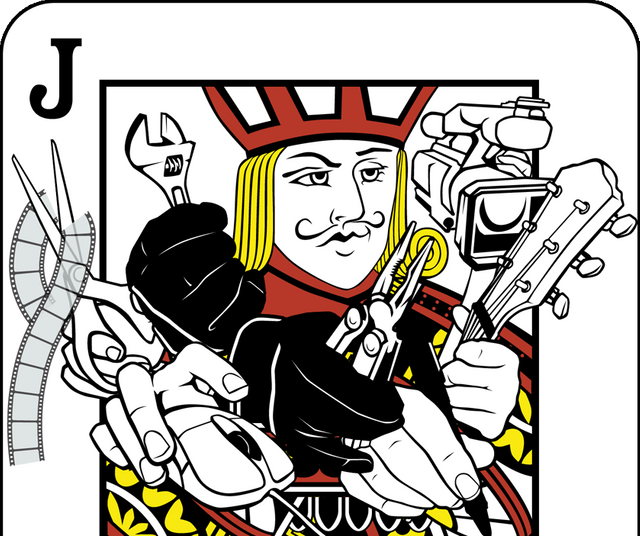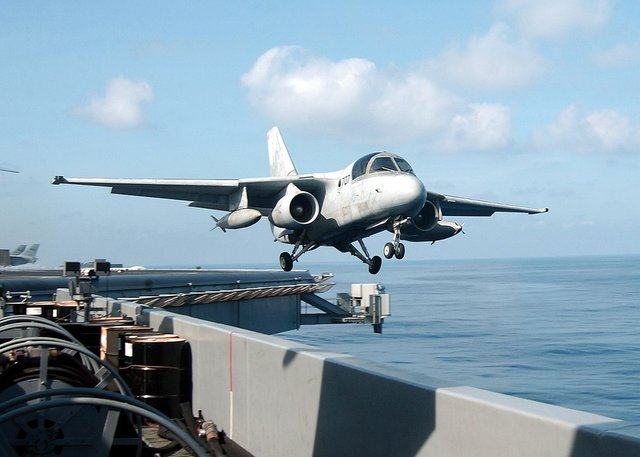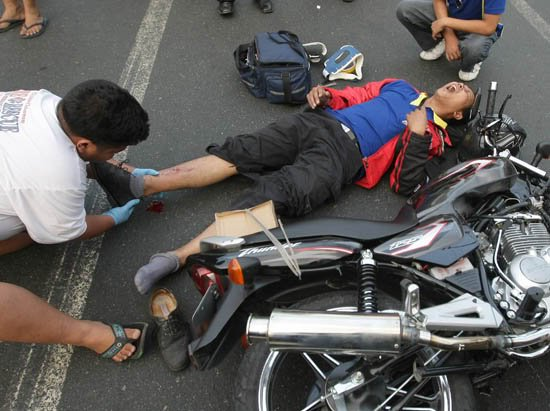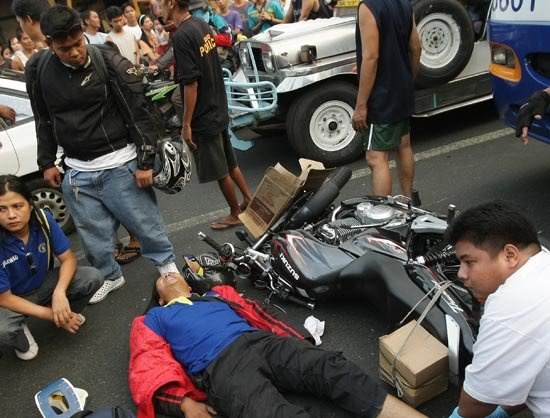IJCH - Inside JaiChai's Head
(Meaning: My Warped, Personal Opinions and Musings)
From the Author:
Salutations.
I am JaiChai.
And if I haven't had the pleasure of meeting you before, I'm delighted to make your acquaintance now.
I invite you to interact with everyone, learn, and have as much fun as possible!
For my returning online friends, "It's always great to see you again!"
Once an Independent Duty Corpsman, Always...
For many years on active duty, I was called "Doc" by my Sailors and Marines - an "Independent Duty Corpsman".
What's that you say?
A military medical professional qualified to perform advanced medical procedures and dispense controlled medications that no civilian Physician Assistants, Nurse Practitioners or new physicians are allowed to even think of doing/prescribing.
An IDC is an enlisted medical specialist that is deployed to hazardous duty environments that no sane doctor - for whatever amount of money - would voluntarily go, while the military can pay that IDC fuckin' peanuts!
In fact, without further education, a recently discharged Independent Duty Corpsman can challenge the RN exam or take an accelerated PA curriculum leading to full licensure.
Imagine that?
Jack of All Trades -
In addition to my Navy Diving, Free-Fall Parachuting training, and traditional emergency/trauma training, I was fortunate to receive a Hell of a lot of specialized medical training.
Every different U.S. Navy Qualification is given a certain number (a code) that identifies the category of training, skills acquired and recognized Naval Enlisted Classification (NEC) Code qualification.
In the Marine Corps and Army, these specialties are called Military Occupational Specialty (MOS) Codes.
I got a few of those too.
Anyway, here's a few NECs I've held:
Field Medical Service Technician (FMST) NEC 8404 -
This formal training school familiarizes personnel to be assigned with USMC organizations. USMC organizational processes and procedures, competency in Marine Corps Martial Arts Program (MCMAP), logistics, and administrative support in a field environment.
Additionally, training will include general military subjects, individual and small unit tactics, military drills, physical training/conditioning, and weapons familiarization with the opportunity to qualify on the rifle. Completion of FMST results in the student receiving Navy Enlisted Classification HM-8404.
Duration: 8 weeks
Location: Field Medical Training Battalion at Camp Pendleton/Camp Lejeune
Aerospace Medicine Technician -
The Aerospace Medicine Technician "C" school (NEC-8406) is a ten-week course to train hospital corpsmen as flight surgeon assistants. This course is designed to teach hospital Corpsmen the theory and practice of aviation medicine.
The AVT will become a resident expert in aviation medicine policy and procedures to assist the flight surgeon in physical exams, sick call, health record maintenance, aircraft mishap investigations, and other duties assigned by their attending flight surgeon AVT’s are routinely assigned to aircraft carriers, Navy and U.S. Marine Corps squadrons, and highly desirable overseas assignments.
AVT’s are frequently sought out by fellow Corpsmen for their technical expertise and knowledge in all fields of operational medicine.
The course includes training in:
Special Examinations and Treatment
Enforcing Aviation Physical Standards
Aircraft Mishap Investigation
Preparation and Maintenance of Medical Reports and Records
Aerospace Physiology Technician HM-8409 (APT) -
HM 8409 training starts with Naval Survival Training Institute (NSTD) onboard Naval Air Station Pensacola in Pensacola, Florida.
Students are trained to be Aerospace Physiology and Water Survival Instructors and safety observers. Instruction includes aeromedical aspects of flight, in-flight visual problems, spatial disorientation, low pressure chamber systems and operations, emergency egress systems, personal and flighty survival equipment, laser safety, night vision devices, medical intelligence and water survival techniques.
Naval Aviation Water Survival Training Program Instructor (NAWSTPI) NEC 9504 -
"The survival swimming skills, techniques, and procedures outlined in the Naval Aviation Water Survival Training Instructor (NAWSTPI) course are designed to teach personnel how to cope with unique aspects of survival at sea.
Naval Aviation Water survival training experts have created these procedures to enable swimmers to survive in the face of life and death situations, hypothermia from cold water, low visibility in the darkness of night ops, negatively buoyant (heavy, sinking) equipment, restrictive obstacles and clothing, turbulent seas and life threatening or incapacitating injuries.
Needless to say, these survival swimming techniques are far removed from those encountered in recreation and competition and may seem quite unorthodox to the layman." - Jaichai (~mid 1980's)
Moving on...
Although I have held quite a few other NECs, I won't bore you with their description.
By now, I'm sure you get the picture:
"In certain situations, the mind turns off and the training kicks in."
Which leads me to a rather atypical afternoon.
Time for Beer -
I could clearly hear my liver reminding me what time of the day it was (Beer-Thirty in the afternoon):
"Sweet Buddha on a cracker! It's almost 4pm!"
"We'd better start drinking now, or we'll be up all night!" my liver and in fact, a chorus of other organs were screaming at me.
Sari-Sari Stores - You Got'ta Love 'Em!
On every street corner in the Philippines, you can find a neighborhood sari-sari store - basically a Mom and Pop version of a 7-11.
They are open almost 24 hrs./day.
If it looks closed, all one has to do is ring the Philippine version of a doorbell; that is, knocking on the window sill and yelling "Ay-yo!" for several minutes until someone responds to the incessant howling of the customer!
Luckily, the store was usually open when "Beer-Thirty" rolled around.
So, I made my slothy-schlep to the sari-sari store located near my house at the highway (just a two-lane busy road ubiquitously named "National Highway") "crossing" (intersection).
Just as I was ready to order my beer, a loud screech and crash filled the air and jerked my and the store owner's heads towards a moto (scooter) accident that just happened a few meters on the highway.
Moto Accidents in the Philippines - A Very Common Occurrence!
Moto accidents happen daily in my little city.
It seems like the normally mild-mannered Filipino succumbs to both road rage and delusions of grandeaur everytime they strap on their scooter.
They can be seen zig-zagging in between cars and passing on the right (the suicide) side of vehicles.
Consequently, seeing a moto accident is treated as nonchalantly as earthquakes in California and hurricanes in Florida.
Old Habits Die Hard (or How I Couldn't Just Standby, Watch and Do Nothing!) Image caption
Image caption
I trotted to the accident scene and initially planned to simply observe.
But after I made a quick assessment of the situation, I knew I couldn't idly standby.
As usual, at every accident scene in every country, most of the nearby people were gawking; giving "the stare of life" as though the mere act of looking will somehow help the victims?
I could clearly see that the driver (an old man) was unconscious and his rider (an old woman who appeared to be his wife) was hysterical and pleading for someone to help.
Shit! I guess it was time for me to help.
I immediately started barking orders in English and in Visayan.
I got the wife to shut up by using the oldest trick in the book: "If someone is being a pain in the ass, give them a job to do!"
The wife's job was to steer traffic away from me and the victim.
The old man required CPR, which I did like an automaton.
Luckily I didn't break any of his ribs - a common byproduct of CPR on the elderly no matter how careful the rescuer performs the procedures.
After three cycles I was lucky again - the man came around (pulse and breathing restored). Then a secondary assessment revealed only a possible broken leg and moderate bleeding from multiple abrasions.
Quickly, I made a makeshift cervical collar from someone's hanging laundry (towels) and leg splint from some discarded bamboo. Both devices were secured by some leftover moto inner tubes from a nearby vulcanizer shop.
I ordered some onlookers to make simultaneous calls for an ambulance and help me move the victim away from the moto and out of the oncoming traffic.
The moto had to stay in place for police/accident photos.
The wife and some other bystanders flagged down an empty pig hauler.
But before we could move the old man into it for transport to the city hospital, I heard an ambulance siren.
Time for me to make like a ghost and disappear, pronto!
Why?
I do not trust the Good Samaritan Laws in the Philippines, especially since I am regarded by the locals who know me as a "Rich foreigner".
"How much is this gon'na cost?!"
"Don't Worry, I think I saw a foreigner at the scene..."
I gave a kid 100 pesos for his baseball cap, put it on, pulled it down to cover my eyes and slipped away before the ambulance arrived.
Free Beer!
As I walked past the sari-sari store, the owner (who witnessed everything), put a finger to her lips and gave me a free ice-cold beer!
Like I said, "Sari-Sari Stores - You Got'ta Love 'Em!"
Parting Shot: "Old Habits Die Hard" - Mick Jagger
By JaiChai
Thanks for stopping by.
Truly hope to see you again!
About the Author
Believing that school was too boring, he dropped out of High School early; only to earn an AA, BS and MBA in less than 4 years much later in life – while working full-time as a Navy/Marine Corps Medic.
In spite of a fear of heights and deep water, he performed high altitude, free-fall parachute jumps and hazardous diving ops in deep, open ocean water.
After 24 years of active duty, he retired in Asia.
Since then, he's been a full-time, single papa and actively pursuing his varied passions (Writing, Disruptive Technology, Computer Science and Cryptocurrency - plus more hobbies too boring or bizarre for most folk).
He lives on an island paradise with his teenage daughter, longtime girlfriend and three dogs.